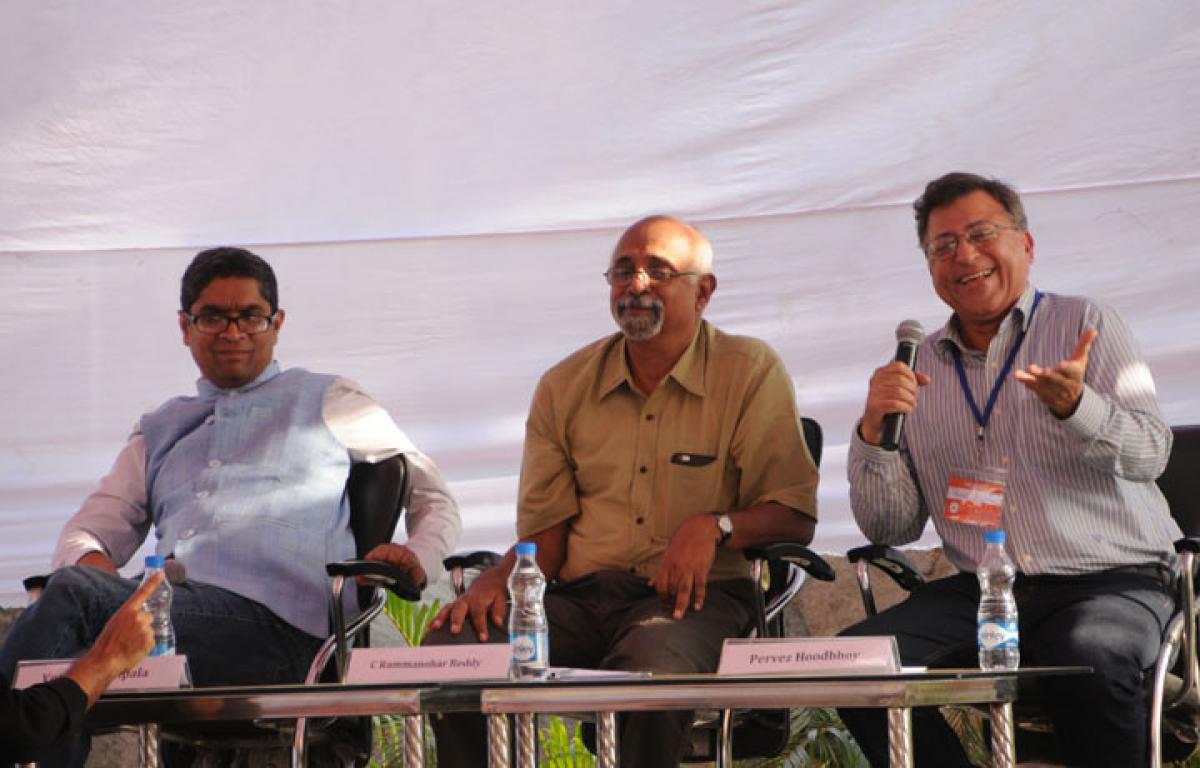Live
- Centre launches campaign for assessment year 2024-25 to help taxpayers
- Dutch cabinet holds out after crisis talks
- Rashmikasparks buzz on Grazia cover page
- Shiva Rajkumar scores another blockbuster with ‘Bhairathi Rangal;’ Telugu release coming soon
- Nayanthara’s open letter to Dhanush: A shocking rift
- ‘Govt job’: Punjab has emerged as role model state, says Kejriwal
- BGT 2024-25: Shubman Gill suffers left-hand injury in training ahead of Perth Test
- Slur against Kumaraswamy wrong, Minister Zameer will be corrected: K’taka Cong
- Australian towns ordered to evacuate amid bushfire threat
- BJP backs LG's crackdown on illegal immigrants in Delhi
Just In

He also spoke about how partition is the result of bargaining gone awry and was stowed down the throat of a reluctant Jinnah, who had a very vague idea of what Pakistan is and left it to his people to imagine it in the way they wanted to.
When Pervez Amirali Hoodbhoy from Islamabad, a member of the UN Secretary General’s Advisory Board on Disarmament Affairs, a mathematician and considered as one of the 100 most influential global thinkers by the Foreign Policy magazine was in conversation with Venkat Dhulipala, the author of the much discussed book, ‘Creating a New Medina: State Power, Islam, and the Quest for Pakistan in Late Colonial North India’ as the Editor of Economic and Political Weekly, C Rammanohar Reddy moderated, it was obviously full house at HLF 2016.
Pervez mentions that while India and Pakistan have come a long way since the two-nation theory of Jinnah that believed, Hindus and Muslims having different cultures and language cannot live together and religion has been the basis for formation of Pakistan, it didn’t work as was seen in 1971, when East Pakistan broke away. “Perhaps notion of nation needs an extension – Today post 1971, we are faced with issue with what is really the basis of Pakistan.
There are different nationalities, languages and religions that are in conflict in Pakistan that led to 50,000 or more killings in last 19 years. I would like re-imagine Pakistan as a country where every citizen has same rights as the other irrespective of class, religion, race.” Even while mentioning that the idea may not be such a welcome one in his own country, he goes on to express the hope that it becomes a secular country. “Eventually that is the only way forward,” he reiterates.
Venkat Dhulipala, a researcher and scholar wrote an elaborate book on the theory of partition related various theories behind partition and said that according to one notion Jinnah was a secular man and had wanted Pakistan to be a European styled nation state and if he was around for a while, like Nehru, he would have nurtured a new nation and Pakistan would have been a mirror-image of India. He also spoke about how partition is the result of bargaining gone awry and was stowed down the throat of a reluctant Jinnah, who had a very vague idea of what Pakistan is and left it to his people to imagine it in the way they wanted to.
Speaking about the situation in Pakistan where he grew up almost along with the new nation, he says how he had Parsis, Christians and Hindus in his neighbourhood in Karachi and they all lived with good will towards each other, “It was very different from what it has become today. Karachi was like Bombay and Lahore was like Delhi. We even had wine shops across the city. But something changed it.
It didn’t start with General Zia ul Haq, but with Zulfiqar Ali Bhutto, who had a lot of pressure from the mullahs and he started giving them one concession after the other. He declared Friday, a holiday. He declared Qadiyanis to be non-Muslim – however, real damage happened with Zia Ul Haq though.”
Speaking about Jinnah, he says, “Jinnah was thoroughly confused. On one hand he said everyone is equal citizen of the country, and on the other hand he said it has to be an Islamic state. Till date, Muslims are confused on what is an Islamic state, because of the simple reason that the word state does not occur in Quran.
There is no such word in Arabic for a State. Jinnah did not know what an Islamic state is. It was in this state of confusion, my country was born. And to resolve this confusion, Sharia law was applied by General Zia ul Haq. Again, there is no consensus on the right sharia, and hence this was not implemented well, either.”
Reaffirming his faith is secularism, Pervez says, “If Pakistan becomes an Islamic state, then it will destroy itself. What will happen to our Shias, Hamidis, Bohras, Ismailis, Zikris. My country lives in confusion, but will be redefined by the people as a country for its people; that means, it has to be eventually secular and all progressive Pakistanis have to fight for it.”

© 2024 Hyderabad Media House Limited/The Hans India. All rights reserved. Powered by hocalwire.com







